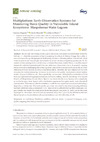Please use this identifier to cite or link to this item:
https://accedacris.ulpgc.es/jspui/handle/10553/70997
| Title: | Multiplatform earth observation systems for monitoring water quality in vulnerable inland ecosystems: Maspalomas water lagoon | Authors: | Eugenio, Francisco Marcello, Javier Martin, Javier |
UNESCO Clasification: | 3325 Tecnología de las telecomunicaciones | Keywords: | Airborne Drone Hyperspectral Imagery Inner Lake Multiplatform, et al |
Issue Date: | 2020 | Journal: | Remote Sensing | Abstract: | The accurate monitoring of water quality indicators, bathymetry and distribution of benthic habitats in vulnerable ecosystems is key to assessing the effects of climate change, the quality of natural areas and to guide appropriate biodiversity, tourism or fisheries policies. Coastal and inland water ecosystems are very complex but crucial due to their richness and primary production. In this context, remote sensing can be a reliable way to monitor these areas, mainly thanks to satellite sensors' improved spatial and spectral capabilities and airborne or drone instruments. In general, mapping bodies of water is challenging due to low signal-to-noise (SNR) at sensor level, due to the very low reflectance of water surfaces as well as atmospheric effects. Therefore, the main objective of this work is to provide a robust processing framework to estimate water quality parameters in inland shallow waters using multiplatform data. More specifically, we measured chlorophyll concentrations (Chl-a) from multispectral and hyperspectral sensors on board satellites, aircrafts and drones. The Natural Reserve of Maspalomas, Canary Island (Spain), was chosen for the study because of its complexity as well as being an inner lagoon with considerable organic and inorganic matter and chlorophyll concentration. This area can also be considered a well-known coastal-dune ecosystem attracting a large amount of tourists. The water quality parameter estimated by the remote sensing platforms has been validated using co-temporal in situ measurements collected during field campaigns, and quite satisfactory results have been achieved for this complex ecosystem. In particular, for the drone hyperspectral instrument, the root mean square error, computed to quantify the differences between the estimated and in situ chlorophyll-a concentrations, was 3.45 with a bias of 2.96. | ISSN: | 2072-4292 | DOI: | 10.3390/rs12020284 | Source: | Remote Sensing [ISSN 2072-4292], v. 12 (2), 284, (Enero 2020) |
| Appears in Collections: | Artículos |
SCOPUSTM
Citations
10
checked on Jun 8, 2025
WEB OF SCIENCETM
Citations
8
checked on Feb 22, 2026
Page view(s)
105
checked on May 18, 2024
Google ScholarTM
Check
Altmetric
Share
Export metadata
Items in accedaCRIS are protected by copyright, with all rights reserved, unless otherwise indicated.
